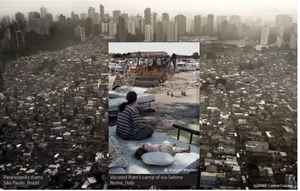No harmony without inclusion
The following statement was issued today in Geneva by the Special Rapporteur of the Human Rights Council on adequate housing, Raquel Rolnik, on the occasion of World Habitat Day:
"Can we celebrate today World Habitat Day with joy and hope?"
This year's theme is "Harmonious Cities". Are the world cities heading towards harmony? One of every three city dwellers lives in a slum. The growth of slums in the last 15 years has been unprecedented. Today there are approximately 998 million slum dwellers in the world. UN-HABITAT estimates that if current trends continue. They will be 1.4 billion by 2020.
Living in slums means being deprived of access to adequate sanitation, , education, and health care or to other services and opportunities. It also means being excluded from full participation in civic life and the exercise of citizen's rights, as slums are considered illegal, informal or transitory and in any case a non-permanent part of a city's political and economic fabric. Many urban and housing policies in developed as well as in developing countries, under democratic or authoritarian regimes, seek to bring "harmony" to the city by evicting the poor from the better-resourced urban areas.
Mass evictions from slums and squatter settlements in various cities in recent years suggest that security of tenure is becoming increasingly precarious. Evictions are often carried out to make room for large-scale infrastructure or city "beautification" programmes. Many of these evictions are carried out without legal notice or due process. They ignore the right to adequate housing of every human being. They fail to recognize that harmony without inclusiveness is deceptive and cannot be sustained.
The global observance of this year World Habitat Day is led from the Angolan capital, Luanda. Angola, like other countries, faces today a tremendous challenge. Sub-Saharan Africa is the region of the world where slums and urban growth rates are the highest in the world representing 4.53 per cent and 4.58 per cent per year respectively.
When it became independent in 1975, Luanda had a population of 500,000. During the civil war, 3.5 million displaced persons found refuge in slums around Luanda in precarious living conditions, without access to basic services. Today, very few of them want to return to their land, marked by the memory of hunger and the forced enrolment of their children by parties to the conflict.
Today Angola earns billion of dollars selling diamonds and oil. But for most of the population of the slums of Luanda, oil is only the liquid they use in their lamps, as most households do not have access to electricity.
A master plan for the reconstruction of the country's infrastructure, completely destroyed by the conflict, is being implemented by the Government. Among various initiatives, a project of urban renewal for Luanda Bay tries to attract private investment.
Angola has gone through an electoral process to consolidate peace and democracy. An important task now is to include all slums inhabitants as full citizens, respecting their rights and desire to stay and improving their settlements towards adequate housing conditions. For Angola, Habitat Day and its celebration is an opportunity to affirm the commitment of the elected government to integrate and implement the right to adequate housing in national and local legislation and policies.
For the world, it is a day to reflect how much an exclusionary pattern of urban development negatively impacts harmony, peace and human rights for all.
For further information on the mandate and work of the Special Rapporteur on adequate housing, please consult the website of the Office of the High Commissioner for Human Rights at: http://www2.ohchr.org/english/ issues/housing/index.html

